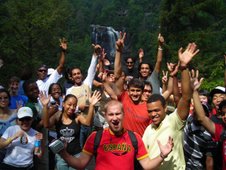OLD MAN AT THE BRIDGE by Ernest Hemingway
1. What is the point of view of the story? That is, who tells the story?
2. What is this man’s job?
3. What is contact?
4. Who or what does the old man symbolize? Consider him generally, but also consider his age and his clothes, the fact that he is “without politics,” etc. Also, why does he repeat the phrase, "I was only taking care of animals."
5. Who or what does the narrator symbolize?
6. All of the following may be symbols. What do you think each symbolizes?
Cat
Pigeons
Goats (do you remember the word I taught you a couple of days ago?)
Bridge and river (Why doesn’t Hemingway say, “ The old man in the ditch or on the roadside”?)
The fact that it is Easter
7. Discuss the last sentence of the story. It is a good example of bitter*______________?
8. What is the theme of the story?
VOCABULARY
Spectacles
Pontoon bridge
Stagger
Spokes
Bridgehead
Cart
Shepherd
Herdsman
Rimmed
Artillery
Fork
Unquiet (also disquiet)
Blankly
*bit•ter (bĭt'ər)
adj., -er, -est.
1. Having or being a taste that is sharp, acrid, and unpleasant.
2. Causing a sharply unpleasant, painful, or stinging sensation; harsh: enveloped in bitter cold; a bitter wind.
3. Difficult or distasteful to accept, admit, or bear: the bitter truth; bitter sorrow.
4. Proceeding from or exhibiting strong animosity: a bitter struggle; bitter foes.
5. Resulting from or expressive of severe grief, anguish, or disappointment: cried bitter tears.
6. Marked by resentment or cynicism: “He was already a bitter elderly man with a gray face” (John Dos Passos).
Subscribe to:
Post Comments (Atom)

1 comment:
Keep up the good work.
Post a Comment